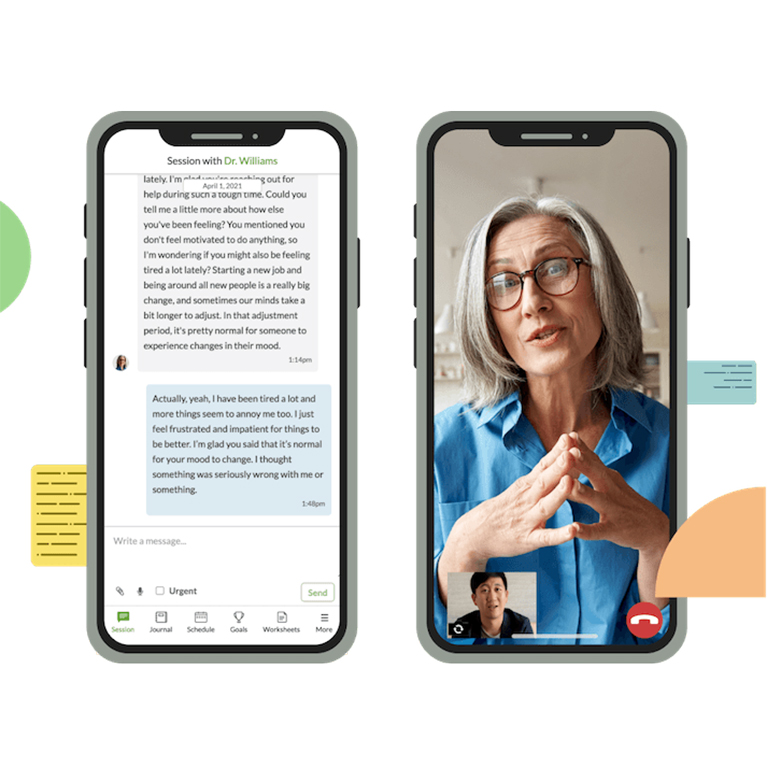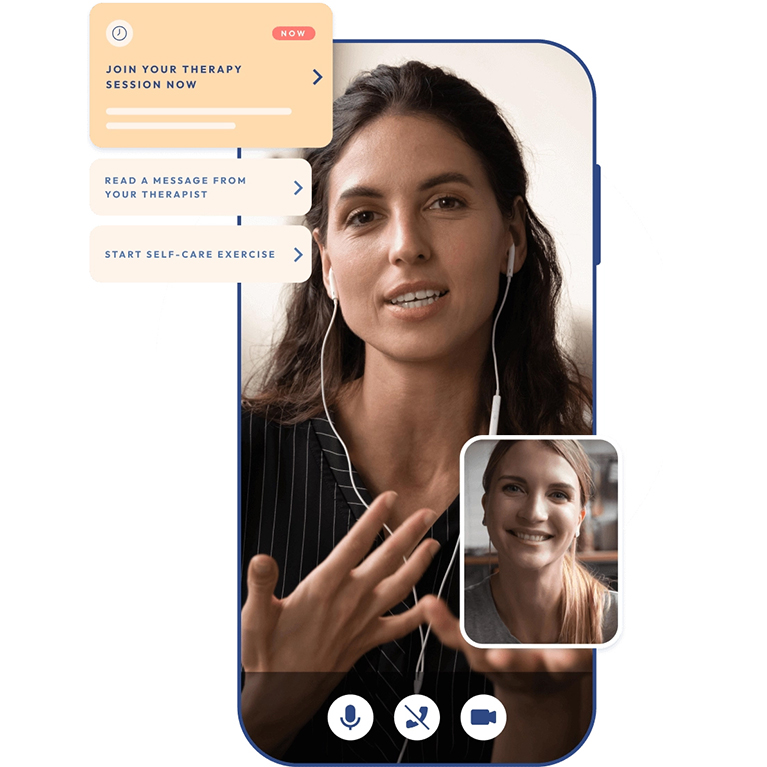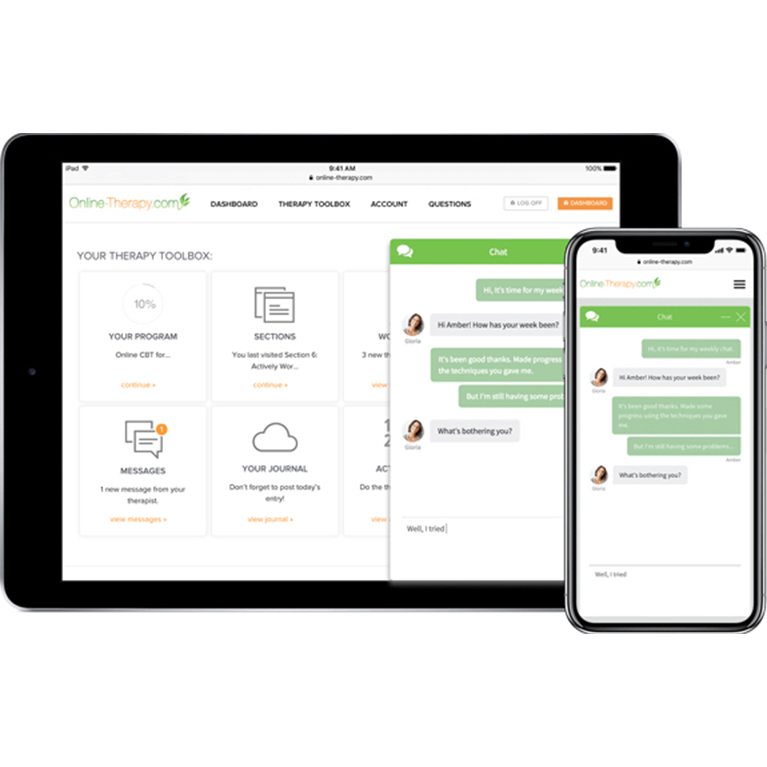Thriveworks is an online therapy platform that offers evidence-based individual, couples, and family therapy for children, adolescents, and adults. It offers a range of licensed therapists and providers with various clinical specialties. Various communication methods are available, helping to make effective therapy accessible and possible. In-person therapy sessions and telephone and video sessions are offered from the comfort of one’s home. Medication services are also provided online through video messaging.
“Therapy alone can be effective depending on your symptoms and their severity. Medication may help alleviate symptoms and make life more manageable. But, in many cases, a combination of therapy and medication is most effective. Whether you’re looking for therapy, medication, or both, platforms like Thriveworks that offer various services can make comprehensive mental health care accessible and convenient,” says Geralyn Dexter, PhD, LMHC.
Given the significant mental health crisis in our country, this platform provides clinical support and services promptly to users who may otherwise not be able to receive it. (1) The forms of therapy offered can help address clinical struggles, family, and relationship dynamics and help individuals feel seen, heard, and validated—all of which are integral to well-being. (2)The attachments or emotional bonds we form with our caregivers significantly impact our adult relationships and mental health. (3) With Thriveworks offering these options for individuals and family systems, the platform provides a valuable tool for improving well-being.
In addition to talk therapy, Thriveworks offers content on self-care strategies for handling stress and anxiety, as well as mind-body modalities, such as yoga. A growing body of research supports the value of these foundational aspects of health in addressing and regulating mental health. (4) While psychotherapy and medication management are imperative for many, lifestyle factors, including nutrition, sleep hygiene, sunlight exposure, and movement, are all influential in modulating biological aspects that relate to our mental health. (6) This is important as mental health encompasses the interrelated connections of the body and mind. (7)


Key product features
What you should know
Thriveworks provides evidence-based therapy modalities through various communication methods, making therapy convenient, flexible, and effective. This platform has diverse therapists with varying specialties. The therapy process can begin in as little as one week, depending on your availability, that of your therapists, and the specialty you’re looking for.
- Thriveworks offers valuable resources that include self-care practices, mindfulness, and information on divorce and anxiety.
- The platform offers in-person services, online and telephone therapy, and psychiatric medication.
- You can expect evidence-based therapies, including cognitive behavioral therapy (CBT), mindfulness-based cognitive therapy, attachment-based therapy, and dialectical behavior therapy (DBT), supporting a range of mental health conditions and relationships.
- Licensed therapists with varying specialties on the platform support a range of mental health conditions.
- Users can track their progress by documenting key insights and observations with an app that allows them to take notes that support ongoing progress in and out of sessions.
- The therapy process can begin in as little as seven days for new clients.
- While Thriveworks offers an important array of therapy modalities and clinical support in terms of medication, it’s not appropriate for those in an immediate mental health crisis.
What is Thriveworks?
Thriveworks is a private, clinician-owned national outpatient mental health practice that conveniently prioritizes high-quality, evidence-based therapy. It offers various plans to accommodate diverse clients, including individual therapy, couples therapy, and child/teen therapy online, by phone, or in person at one of its 340+ locations. Medication management can be added in addition to individual therapy, though it’s online-only. However, individual treatment alone does not involve medication, nor do the other therapy modalities. This service can be added with therapy, supporting individuals who may benefit from or warrant medication. Medication services are offered solely online.
Psychotherapy sessions focus on conditions rooted in emotions and behavior, such as anger, grief, anxiety, depression, trauma, and post-traumatic stress disorder (PTSD). “When starting therapy, it’s important to understand what you’re experiencing and how your symptoms affect your daily life and goals. Communicating what brought you to therapy and what you hope to accomplish with your provider helps you work together to determine the best treatment approach,” states Dr. Dexter.
A session may focus on identifying underlying thoughts and feelings associated with mental health or relationship struggles, as well as appropriate identification and utilization of coping skills in and out of the session. Users can log information outside of the session on the app. This is important as it helps users build interoception skills or awareness of their body’s signals and states. It’s valuable to the therapy process to better understand one’s emotions. (8)
Psychiatry services treat conditions rooted in neurobiology and referenced in the DSM-5-TR to determine which medications will be prescribed for users. Prescribers note an in-depth understanding of the underlying neurobiology that contributes to mental health conditions, which I respect and value as they can target their approaches to these needs. If clinically warranted, engaging in both modalities often yields the most efficient results. (9)
Additionally, this platform offers resources addressing some holistic aspects of mental health, including self-care practices, mindfulness, stress reduction, and yoga. It would be incredible if the platform could provide further holistic, mind-body strategies for improving mental health through body-mind modalities, as these may further support underlying biological imbalances in the body and mind that may contribute to mental health challenges. (5)
What our experts say
Dr. Dexter, PhD, LMHC, shares, “From a clinician’s perspective, Thriveworks’ flexibility in offering video, phone, or in-person sessions allows providers to connect with clients in ways that best suit their needs. This may help keep clients engaged, leading to better outcomes in therapy and their lives. Because Thriveworks offers different types of therapy and specializations, clients can often address multiple issues in-house, taking the stress out of finding other providers and potentially improving continuity of care.”
What customers are saying
A look at user reviews on Trustpilot revealed many positive reviews for Thriveworks, especially regarding its therapists. However, overall Trustpilot earns a 1.6-star rating across 105 reviews.
Thriveworks user Hannah M. said:
“Thriveworks has been a great option for online counseling services. I have had the pleasure of working with two counselors, one for individual and one for marriage counseling. Our marriage counselor was exactly what we have needed for so long. She has been amazing to work with and has helped us save our marriage.”
Hannah M., Trustpilot
Similarly, Thriveworks user Zvon E. reported satisfaction with their therapist. They said, “Thriveworks has been the best source of therapy I have ever had. I initially had a great therapist I was able to talk to, which is actually part of my issue, talking. I decided to stop therapy but realized that I needed some more…My second therapist was also very effective. If it wasn’t for my two therapists, I don’t know how I’d be doing. I do, but it’s not as good. I highly recommend Thriveworks.”
However, a few users, like Angela, noted some concerns with logistics on the user portal. She said, “I have been unable to access my patient portal. I spent four hours talking to customer support and billing…Horrible, horrible service. I love my therapist, but when I am done with therapy, I will never use Thriveworks again until they do something about their customer service and billing departments.”
Specs
| Platform | Video, phone, in-person |
| Ages | Children, teens, and adults |
| Session type | Live video, in-person, or calls |
| Treatment options | Psychotherapy, medication, couples therapy, family therapy |
| Cost | Co-pays: $0-50 depending on insurance and providerSelf-pay options vary by state:Therapy: $100-$150 per sessionPsychiatry: $150 to $400 depending on follow-up vs. initial evaluation |
| Availability | Users have a session within seven days of scheduling |
| Providers | Licensed therapists and psychiatric providers |
Our Thriveworks experience
Overall, my experience with Thriveworks was mainly positive. So many individuals struggle with their mental health in silence and experience lengthy wait times for quality clinical care. (10) Thriveworks provides therapy services to a range of youth and adults who may otherwise not receive them promptly or at all in some cases. Relationship and family therapy are also incredibly valuable tools for improving well-being, which are central components of the Thriveworks platform. I’d love to see additional resources on attachment regulation and competency (ARC), as this framework is well-researched to support children and adult relationships. (11)
Thriveworks offers mental health therapy services through various communication methods, from the convenience and privacy of users’ homes to telephone, video call, and in-person. These methods make mental health services more accessible to individuals, couples, and families. With various therapists across many clinical backgrounds, users can easily determine which one is best for them and their unique needs.
Individuals seeking therapy, whether individuals, families, or couples, can learn more about themselves simply by becoming more attuned, mindful, and curious about their thoughts and emotions. (12) Bringing awareness to our body’s sensations, connecting these with our thoughts and emotions, and learning what our body needs are important in the therapy process. (8) This helps us to implement mindfulness while also addressing interoceptive (pertaining to the internal world) and exteroceptive (the perception of the external world) processes, having favorable effects on the body and brain in the long term. (13, 24) Thriveworks offers many therapies that encourage these.
While I think this is great, I’d love to see this platform offer more holistic resources, psychoeducation, and mind/body modalities. Mental health encompasses the body and mind, as they are intricately connected. (7) This is now more than ever supported by the research. (14) In addition to allowing ourselves to feel our emotions in healthy, constructive ways, attuning to our body and mind’s needs for movement, rest, connection with others and nature, exposure to sunlight, adequate nutrition and hydration, mitigating stress, and cutting down excessive screen time and social media use are all significant. (15, 16, 17, 5, 6) While I was happy to see that the platform had some resources on overall self-care, mindfulness, and yoga, I think overall offering greater depth on these topics in conjunction with relationship, family, and individual therapy would strengthen this platform. (18, 19)
How we test online therapy
When evaluating teletherapy platforms, we focus on several key areas to ensure quality and effectiveness in delivering mental health services.
Therapist quality—30%
A high-quality teletherapy service should connect users with certified and experienced, compassionate therapists, ensuring that interactions feel personal and individualized rather than generic. After all, there’s no one size that fits all when it comes to effective therapy. We prioritize expertise and the ability of the therapist to address the multifaceted needs of the individual, as well as the overall quality of interaction between the therapist and the client. Therapy modalities are also significant in our reviews.
Here’s what we look for:
- Expertise
- Personalization
- Interaction quality
Accessibility and convenience—30%
Teletherapy can significantly enhance an individual’s ability to engage with mental health services, particularly for those facing challenges like scheduling conflicts, transportation issues, or other confounding factors. This is of utmost importance as seeking quality mental health treatment shouldn’t be difficult or stigmatized.
We evaluate:
- Ease of use
- Availability
- Platform reliability
Cost and value—20%
Cost and value reflect the financial barriers many face in accessing mental health care. Here’s what we factor into a teletherapy’s cost and value rating:
- Pricing transparency
- Insurance and coverage
- Value for money
Support and resources—10%
We recognize that mental health care extends beyond individual sessions. Access to supplementary materials and ongoing customer support is vital for reinforcing therapeutic gains.
Our factors in this rating include:
- Supplementary materials
- Customer support
- Aftercare
Privacy and security—10%
Privacy and security are imperative, as maintaining client confidentiality and data security is significant in teletherapy. We look for compliance with HIPAA regulations, strong encryption methods, and options for user anonymity to protect sensitive client information.
Here’s what we’re looking for:
- Compliance with HIPAA and data protection laws
- Encryption and security measures
- Anonymity options
Compare Thriveworks

|

|

|

|

|
|
| Thriveworks | BetterHelp | Brightside | Talkiatry | Online-Therapy.com | |
| Rating | |||||
| Best for | Families | Diverse therapists | Structured tools | Virtual psychiatry | Holistic toolbox |
| Cost | Per session, co-pay ($0-$50) or pay out of pocket will vary depending on insurance and location | $280-$400 per month | $95-$349 per month | Therapy: $100-$250 per session; Psychiatry: $200 to $400, co-pays (depending on insurance) | $50-$110 per week |
| Session type | Live video, phone call or in person | Live video calls, phone call or chat, and messaging | Live video calls with unlimited messaging | Live video sessions | Video messaging, voice, and text |
| Ages treated | Children, teens and adults | 18+ | 18+ | 18+, Adolescents 13-17 with parent consent. | 13+ (with parent/guardian consent) or 18+ |
How does Thriveworks work?
Thriveworks Counseling offers its therapeutic services in 49 states and the District of Columbia, and plans to continue to expand. It offers online therapy in addition to in-person therapy. It also offers child and teen therapy, couples and marriage therapy, and psychiatric/medication services. Noteworthy, it utilizes CBT and mindfulness approaches, which are notable evidence-based therapies for various mental health and relationship challenges. (20, 21)
Users can call Thriveworks for assistance matching with a clinician within business hours or log on to its website to initiate this process. Individuals can view possible clinicians in their area online, including their credentials, clinical experience, and specialties. Calling a representative can help users find a provider that takes their insurance and meets their individual needs and preferences. Additionally, you can discuss self-pay rates if you do not have insurance.
The self-pay rates vary depending on therapy or psychiatry session, location, and provider. The next process is selecting a date and time that works for you for your first appointment and establishing a payment type to book that appointment. Setting up this information holds your appointment, and payment is due after each session. Meet with your clinician for your session and pay following the session either co-pay with insurance or self-pay through Thriveworks’ secure online platform.
Psychiatry sessions may involve medication management following this assessment. Psychiatry services can prescribe various medications to address a diagnosed condition. These medications include antidepressants and mood stabilizers. In some states, certain prescribers may offer stimulant medications (such as those for attention-deficit/hyperactivity disorder (ADHD)) may be prescribed. However, Thriveworks does not prescribe controlled substances like Xanax® or Klonopin®.
Who is Thriveworks right for?
Thriveworks is suitable for those seeking convenient and accessible outpatient therapy and or psychiatric medication support. It provides therapy in person, online, or by telephone. This platform may be especially fitting for individuals seeking immediate therapy or mental health support, as they can often get a scheduled appointment within a week. Additionally, it’s a more convenient option for those with a limited schedule or difficulties accessing in-person services.
Thriveworks may also be an excellent option for families or couples wanting to engage in therapy together or find therapy for their child or adolescent. It may also support those who would benefit from various forms of treatment, including attachment therapy, CBT, DBT, and mindfulness techniques.
Who should seek an alternative to Thriveworks
People who need support for acute issues, such as episodes of psychosis, mania, or a suicidal crisis, should also seek immediate care. Those seeking higher levels of clinical care, such as partial hospitalization or inpatient hospitalization, and those seeking more holistic modalities to support their mental health, such as naturopathic services, nutrition, functional medicine, and other evidence-based mind-body modalities like biofeedback or eye movement desensitization and reprocessing (EMDR) may want to look for programs that focus on these types of approaches and care.
Please find the following support helplines if you need support; you are not alone.
Mental health National Alliance on Mental Illness NAMI HelpLine: 1-800-950-6264
or text NAMI to 741-741
Crisis Support Services national helpline: 800-273-8255
SAMHSA’s National Helpline (substance abuse and mental health): 800-662-HELP (800-662-4357) Teen Line for youth in need of support: 800-852-8336
Can Thriveworks prescribe medication?
Yes, Thriveworks can prescribe psychiatric medications in conjunction with individual therapy. These services are delivered exclusively online and unavailable at all of Thriveworks’ in-person locations. While some states allow the prescription of ADHD medication, that is the only controlled substance that Thriveworks offers.
Can I receive a mental health diagnosis through Thriveworks?
Yes, mental health clinicians can infer if you meet the criteria for a mental health diagnosis by completing a comprehensive clinical assessment. The Diagnostic Statistical Manual (DSM-5-TR) is the tool clinicians use to assess relative to diagnosis. (22)This manual provides an overview of symptoms of mental health conditions.
Types of plans offered by Thriveworks
Thriveworks offers various plans to accommodate diverse clients, including individual therapy, couples therapy, and therapy for children ages 0-17. As individual therapy alone does not involve medication, psychiatry, and medication services can be added to individual therapy for an additional charge per session, depending on insurance and location.
Individual therapy
Therapy sessions may primarily address underlying thoughts and emotions associated with behaviors and build emotional regulation skills. They’re offered in person and online. No medication is involved.
Psychiatry
Psychiatry services treat conditions “rooted in biology or neurochemistry,” as stated on the Thriveworks website, to determine which medications will be prescribed, if any. They’re offered exclusively online.
Thriveworks pricing
At Thriveworks, you pay per session. Thriveworks accepts multiple insurances, so a co-pay is often only required following your session, depending on your insurance. Most clients can use their insurance, often having to pay a co-pay, which will vary depending on the insurance ($0-$50). Self-pay options are available and will vary based on provider rates and location. Therapy sessions range from $160 to $240 per session. Psychiatry sessions may cost between $210 to $400, depending on whether it’s an initial evaluation or follow-up.
Related: The Best Online Therapy Platforms that Take Insurance
How therapists are onboarded
Thriveworks has a structured onboarding process for their therapists, designed to ensure they are well-equipped to meet clients’ needs and align with Thriveworks’ values. While specific details may vary depending on the location and position, the general onboarding process tends to include the following steps:
- Therapists interested in joining Thriveworks typically go through a thorough application process. This includes submitting resumes, completing questionnaires, and participating in interviews.
- Interviews often assess clinical expertise, alignment with Thriveworks’ values (e.g., client-centered care, professionalism, etc.), and the therapist’s ability to work within a collaborative team environment.
- Thriveworks ensures that all therapists are fully licensed and credentialed in their state of practice. This includes verifying licenses and other professional credentials to meet state and federal requirements.
- Background checks and insurance verification are also part of this step.
- Once hired, therapists participate in initial training. This often includes:
- Orientation to Thriveworks’ model of care and client service.
- Familiarization with company policies, procedures, and software systems (e.g., its telehealth platform).
- Learning about Thriveworks’ expectations for therapist conduct, client management, and documentation.
- Therapists are trained on the technology and systems used to manage appointments, documentation, billing, and telehealth sessions. Thriveworks uses its platform to facilitate virtual therapy sessions, and therapists are expected to use it proficiently.
- New therapists may receive mentorship from more experienced staff to help with transition and development. Peer support is also emphasized, with opportunities for networking and consultation with other professionals.
- Thriveworks encourages continuous learning through professional development opportunities. This may include access to in-house training, workshops, and support for pursuing additional certifications or specializations.
- Therapists often participate in regular case consultations and team meetings to promote collaboration and growth.
- Once onboarding is complete, therapists start seeing clients. Thriveworks typically provides a steady stream of clients, thanks to its extensive marketing efforts, which can help reduce the administrative burden of client acquisition for the therapist.
Overall, the process ensures that new therapists are well-prepared to deliver high-quality care in a supportive and efficient environment.
How many therapists are on the platform?
Thriveworks has over 2,200 clinicians, as indicated on its site. Users can explore the various clinical modalities and expertise of therapists on the platform within their state.
Onboarding new users
The onboarding process includes finding a provider who meets your needs and takes your insurance. You can view clinicians online and review their backgrounds, specialties, and credentials. Once you’ve chosen a therapist, you’ll complete some intake forms in your patient portal, including a current mental health assessment and medical health history. This will help your treatment team get a thorough and holistic view of your mental health condition before your first session.
How are new users matched with a therapist?
New users choose their own therapist after browsing available therapists. Users can filter based on their unique needs, preferences, and therapists’ skill sets. This filtering process also ensures that the therapist or provider takes the user’s insurance. By searching on the online platform, users can explore clinical backgrounds, specialties, therapies offered, and whether they are cognitive-behavioral, solution-focused, or emotional-focused. Users can also filter for factors that may be important beyond clinical expertise, including gender, age, language, and counseling approach.
We’ve Featured Thriveworks in:
- Best Online Family Therapy Services
- Best Online Couples Counseling Platforms
- Best Online Cognitive Behavioral Therapy Options
- Best Online Psychiatrist Platforms that take Insurance
- Best Online Therapy Services for Teens
- Best Online Therapy Options for Kids
How to choose the therapy platform for you
With various online therapy platforms and options available, it’s essential to be selective and thoughtful regarding the best choice for you and your needs. I always encourage clients to be their own advocates in deciding what is best for their health and well-being.
Understanding your needs and values is important when deciphering which therapy platform is best for you. After all, you know yourself best. While many online platforms are effective tools for many individuals, other forms of holistic and evidence-based treatments may also be beneficial in conjunction, such as naturopathic/nutrition practices, sleep hygiene, mind-body modalities, nature therapy, sun exposure, and biofeedback. (19, 23)
FAQs
Does Thriveworks take insurance?
Yes, Thriveworks accepts multiple insurances, including Aetna, Optum/United Healthcare, Blue Cross Blue Shield (BCBS) Plans, Beacon Health, Cigna, Tricare West, Humana, Medicare, and Tufts Health Plan. Please note that Thriveworks may also accept additional insurance platforms, as these vary by state.
How much is Thriveworks without insurance?
Thriveworks self-pay options are available without insurance, starting at $200 per session, based on provider rates and location.
Is Thriveworks legitimate?
Yes, Thriveworks is legitimate. It is a clinician-owned nationwide therapy practice available in 49 states and the District of Columbia. From our review, research, and clinical insights, we have found that Thriveworks is a credible platform for various forms of therapy, provided the users are fully aware of the purpose of the service and support provided, given their needs, preferences, and treatment goals.
How many states are on Thriveworks?
Thriveworks is available in 49 states and the District of Columbia, and it’s continuing to expand.
Our experts
Dr. Geralyn Dexter, PhD, LMHC
Geralyn Dexter, PhD, LMHC (she/her) is a writer, editor, professor, researcher, and clinician. She received a PhD in Psychology from Northcentral University, a Master of Science in Mental Health Counseling from Nova Southeastern University, and a Bachelor of Science in Psychology from the University of Florida. Dr. Dexter has over a decade of clinical and editorial experience. She’s practiced and supervised in intensive outpatient, community-based settings, private practice, telehealth, and mental health startups. Dr. Dexter is also a qualitative researcher whose interests include suicidal ideation and behavior and non-suicidal self-injury.
Krista Manning
Krista Manning is an accomplished medical copy editor and fact-checker who stands out in the pharmaceutical, health, and wellness domains. With a meticulous eye for detail and a command of medical language, Krista ensures the accuracy and clarity of content. Beyond her professional expertise, Krista is an advocate for mental health awareness. Recognizing the crucial intersection of psychological and physical well-being, she actively contributes to projects that promote mental health awareness within the healthcare narrative. Krista’s commitment extends beyond the pages she edits, emphasizing the holistic nature of health communication.

Lauren Teeter, MS, CNS, MSW, LCSW
Fortune Recommends Writer
About Author
Sources
- Stringer, H. (2024, January 1). Mental health care is in high demand. Psychologists are leveraging tech and peers to meet the need. Monitor on Psychology, 55(1). https://www.apa.org/monitor/2024/01/trends-pathways-access-mental-health-care
- Weir, K. (2018, March 1). Life-saving relationships. Monitor on Psychology, 49(3). https://www.apa.org/monitor/2018/03/life-saving-relationships
- Sagone E, Commodari E, Indiana ML, La Rosa VL. Exploring the Association between Attachment Style, Psychological Well-Being, and Relationship Status in Young Adults and Adults-A Cross-Sectional Study. Eur J Investig Health Psychol Educ. 2023 Feb 24;13(3):525-539. doi: 10.3390/ejihpe13030040. PMID: 36975392; PMCID: PMC10047625. https://pubmed.ncbi.nlm.nih.gov/36975392/
- Hosker DK, Elkins RM, Potter MP. Promoting Mental Health and Wellness in Youth Through Physical Activity, Nutrition, and Sleep. Child Adolesc Psychiatr Clin N Am. 2019 Apr;28(2):171-193. doi: 10.1016/j.chc.2018.11.010. Epub 2019 Feb 6. PMID: 30832951. https://pubmed.ncbi.nlm.nih.gov/30832951/
- Warren A, Nyavor Y, Beguelin A, Frame LA. Dangers of the chronic stress response in the context of the microbiota-gut-immune-brain axis and mental health: a narrative review. Front Immunol. 2024 May 2;15:1365871. doi: 10.3389/fimmu.2024.1365871. PMID: 38756771; PMCID: PMC11096445. https://pmc.ncbi.nlm.nih.gov/articles/PMC11096445/
- Bekdash RA. Epigenetics, Nutrition, and the Brain: Improving Mental Health through Diet. Int J Mol Sci. 2024 Apr 4;25(7):4036. doi: 10.3390/ijms25074036. PMID: 38612845; PMCID: PMC11012292. https://www.ncbi.nlm.nih.gov/pmc/articles/PMC11012292/
- Alessi MG, Bennett JM. Mental health is the health of the whole body: How psychoneuroimmunology & health psychology can inform & improve treatment. J Eval Clin Pract. 2020 Oct;26(5):1539-1547. doi: 10.1111/jep.13386. Epub 2020 Mar 14. PMID: 32171052. https://pubmed.ncbi.nlm.nih.gov/32171052/
- Schmitt CM, Schoen S. Interoception: A Multi-Sensory Foundation of Participation in Daily Life. Front Neurosci. 2022 Jun 9;16:875200. doi: 10.3389/fnins.2022.875200. PMID: 35757546; PMCID: PMC9220286. https://pubmed.ncbi.nlm.nih.gov/35757546/
- Kamenov K, Twomey C, Cabello M, Prina AM, Ayuso-Mateos JL. The efficacy of psychotherapy, pharmacotherapy and their combination on functioning and quality of life in depression: a meta-analysis. Psychol Med. 2017 Feb;47(3):414-425. doi: 10.1017/S0033291716002774. Epub 2016 Oct 26. PMID: 27780478; PMCID: PMC5244449. https://pubmed.ncbi.nlm.nih.gov/27780478/
- Stringer, H. (2024, January 1). Mental health care is in high demand. Psychologists are leveraging tech and peers to meet the need. Monitor on Psychology, 55(1). https://www.apa.org/monitor/2024/01/trends-pathways-access-mental-health-care
- Wentling S, Di Napoli Parr MN, Boroshok AL, Cheng SK, Girard A, Raphael C, Edwards S, Gordon-Achebe K. Integrating the Attachment, Regulation, and Competency Trauma-Informed Framework in Inpatient, Day Treatment, Partial Hospitalization, and Residential Treatment Settings. Child Adolesc Psychiatr Clin N Am. 2024 Oct;33(4):627-643. doi: 10.1016/j.chc.2024.02.006. Epub 2024 Mar 26. PMID: 39277316. https://pubmed.ncbi.nlm.nih.gov/39277316/
- Šimić G, Tkalčić M, Vukić V, Mulc D, Španić E, Šagud M, Olucha-Bordonau FE, Vukšić M, R Hof P. Understanding Emotions: Origins and Roles of the Amygdala. Biomolecules. 2021 May 31;11(6):823. doi: 10.3390/biom11060823. PMID: 34072960; PMCID: PMC8228195. https://www.mdpi.com/2218-273X/11/6/823
- Dunning DL, Griffiths K, Kuyken W, Crane C, Foulkes L, Parker J, Dalgleish T. Research Review: The effects of mindfulness-based interventions on cognition and mental health in children and adolescents – a meta-analysis of randomized controlled trials. J Child Psychol Psychiatry. 2019 Mar;60(3):244-258. doi: 10.1111/jcpp.12980. Epub 2018 Oct 22. PMID: 30345511; PMCID: PMC6546608. https://pubmed.ncbi.nlm.nih.gov/30345511/
- Safari H, Mashayekhan S. Inflammation and Mental Health Disorders: Immunomodulation as a Potential Therapy for Psychiatric Conditions. Curr Pharm Des. 2023;29(36):2841-2852. doi: 10.2174/0113816128251883231031054700. PMID: 37946352. https://pubmed.ncbi.nlm.nih.gov/37946352/
- Walker WH 2nd, Walton JC, DeVries AC, Nelson RJ. Circadian rhythm disruption and mental health. Transl Psychiatry. 2020 Jan 23;10(1):28. doi: 10.1038/s41398-020-0694-0. PMID: 32066704; PMCID: PMC7026420. https://pmc.ncbi.nlm.nih.gov/articles/PMC7026420/
- Adan RAH, van der Beek EM, Buitelaar JK, Cryan JF, Hebebrand J, Higgs S, Schellekens H, Dickson SL. Nutritional psychiatry: Towards improving mental health by what you eat. Eur Neuropsychopharmacol. 2019 Dec;29(12):1321-1332. doi: 10.1016/j.euroneuro.2019.10.011. Epub 2019 Nov 14. PMID: 31735529. https://www.sciencedirect.com/science/article/pii/S0924977X19317237?via%3Dihub
- Hepsomali P, Coxon C. Inflammation and diet: Focus on mental and cognitive health. Adv Clin Exp Med. 2022 Aug;31(8):821-825. doi: 10.17219/acem/152350. PMID: 35951624. https://advances.umw.edu.pl/pdf/2022/31/8/821.pdf
- R P, Kumar AP, Dhamodhini K S, Venugopal V, Silambanan S, K M, Shah P. Role of yoga in stress management and implications in major depression disorder. J Ayurveda Integr Med. 2023 Sep-Oct;14(5):100767. doi: 10.1016/j.jaim.2023.100767. Epub 2023 Sep 21. PMID: 37741161; PMCID: PMC10520539. https://www.sciencedirect.com/science/article/pii/S0975947623000839?via%3Dihub
- Breed C, Bereznay C. Treatment of Depression and Anxiety by Naturopathic Physicians: An Observational Study of Naturopathic Medicine Within an Integrated Multidisciplinary Community Health Center. J Altern Complement Med. 2017 May;23(5):348-354. doi: 10.1089/acm.2016.0232. Epub 2017 Feb 6. PMID: 28165775. https://pubmed.ncbi.nlm.nih.gov/28165775/
- Nakao M, Shirotsuki K, Sugaya N. Cognitive-behavioral therapy for management of mental health and stress-related disorders: Recent advances in techniques and technologies. Biopsychosoc Med. 2021 Oct 3;15(1):16. doi: 10.1186/s13030-021-00219-w. PMID: 34602086; PMCID: PMC8489050. https://pmc.ncbi.nlm.nih.gov/articles/PMC8489050/
- Niedermeier J, Mumba MN, Barron K, Andrabi M, Martin R, McDiarmid A. Relationships Among Exercise, Mindfulness, Mental Health, and Academic Achievement Among Prelicensure Nursing Students. Nurse Educ. 2022 May-Jun 01;47(3):184-189. doi: 10.1097/NNE.0000000000001106. Epub 2021 Sep 17. PMID: 34559767 https://pubmed.ncbi.nlm.nih.gov/34559767/
- American Psychiatric Association. (2013). Diagnostic and statistical manual of mental disorders (5th ed.). Washington, DC: https://www.psychiatry.org/psychiatrists/practice/dsm
- Zagkas D, Bacopoulou F, Vlachakis D, Chrousos GP, Darviri C. How Does Meditation Affect the Default Mode Network: A Systematic Review. Adv Exp Med Biol. 2023;1425:229-245. doi: 10.1007/978-3-031-31986-0_22. PMID: 37581797. https://pubmed.ncbi.nlm.nih.gov/37581797/
- Goral, O., Wald, I.Y., Maimon, A. et al. Enhancing interoceptive sensibility through exteroceptive–interoceptive sensory substitution. Sci Rep 14, 14855 (2024). https://doi.org/10.1038/s41598-024-63231-4
